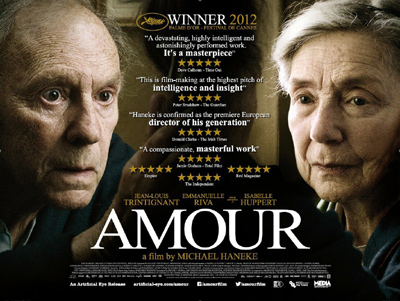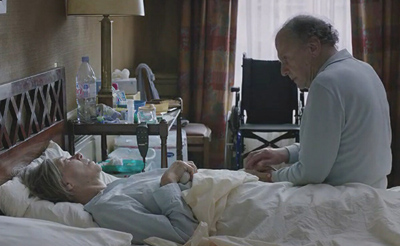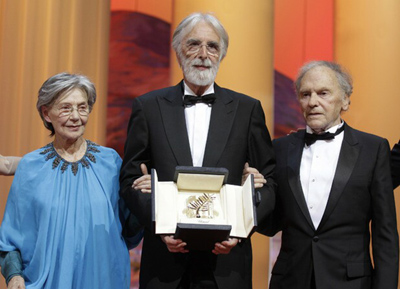Movie Review
 |
 |
 |
 |
 |
 |
 |
A Jolting End to Amour
Recently, I watched a highly acclaimed foreign film from 2012 titled Amour (French for "Love"). The storyline was straightforward enough: it treated the issue of the inevitability of death and how people cope with its reality.
The film was certainly slow-paced, as I fully anticipated going in, but it never really became boring. It held my interest throughout, especially given the talented acting of the main characters, Georges and Anna, played respectively by Jean-Louis Trintignant and Emmanuelle Riva, two well-known stars, as well as some poignant cinematography.
 The movie strove, and generally succeeded, in portraying how an older couple dealt with the change from a normal life to one doomed to end in separation. One night, the couple was out at a theatrical performance without any apparent concerns or inkling of what was to come. The next morning, Anna had a stroke, followed soon after by another worse stroke which paralyzed her on one side.
The movie strove, and generally succeeded, in portraying how an older couple dealt with the change from a normal life to one doomed to end in separation. One night, the couple was out at a theatrical performance without any apparent concerns or inkling of what was to come. The next morning, Anna had a stroke, followed soon after by another worse stroke which paralyzed her on one side.
She received a normally successful medical treatment, but it did not work in her case. Watching the scenario, one has the sense that this could happen to any of us without a moment's notice.
So, it was left to Georges to care for his wife without any real hope of her recovery. Throughout most of the movie, he did a remarkable job of holding himself together while honoring Anna's request not to be institutionalized or hospitalized. While certainly guilty of some impatience now and then, very well depicted in the film, he always recovered, apologized, and did his utmost to see to it that his wife was comfortable and accommodated.
One cannot help but admire the man as he forcefully and successfully defended his course of action against the wishes of his daughter. At one key moment, Georges basically told his daughter to be quiet, reminding her that he loved her mother every bit as much as she did and that he was doing all that he knew how to do in the circumstances.
It would be difficult not to have a respect for such a man, despite the fact that it was clear that religion played little to no part in determining his course of action. This is most regrettable. His action won the praise and admiration of neighbors, who offered him some solace as the situation became increasingly bleak and the end approached.
But then, inexplicably, the unthinkable happened, something that, in light of what I said about my admiration for the man, made me want, proverbially speaking, to "jump though the screen."
 One of the last scenes shows him feeding Anna. Suddenly he stopped. He slowly grabbed hold of a nearby pillow and proceeded to suffocate her.
One of the last scenes shows him feeding Anna. Suddenly he stopped. He slowly grabbed hold of a nearby pillow and proceeded to suffocate her.
I truly did not for a moment see this coming. The man had been so patient and firm despite being visibly shaken and worn-out. But the impression he gave was that he loved his wife and was only looking out for her well-being... and then he killed her.
My impression is that somehow, in the twisted and warped notion of love that modern society has - be it in Europe or in the United States - such an action is deemed as heroic, the ultimate act of sacrifice. The man mercifully put his wife out of her misery and forever lost the love of his life in the process.
What modern man does not understand and, in fact, refuses to understand is that there are certain actions that are, by their very nature, intrinsically wrong.
The act of killing one's spouse should be so morally repugnant as to provoke outrage, no matter what the motivation behind the action. Reading the reviews for the film before watching it, however, while I found no spoilers, there was also absolutely no question raised about the ending of committing euthanasia. I believe that this is indicative of the - not immorality - but amorality of our times. One reviewer actually describes the killing of the spouse as "a surprising yet credible action that intervenes" (Stanley Kauffman, New Republic).
Any justification one might make in favor of "mercy killing" pales in light of the fact that it is murder, a sin against nature and Catholic Morals, a mortal sin that violates the Fifth Commandment. First, man has a body and a soul, the latter which is destined to live forever. All that happens to us now, for better or for worse, has been preordained by God to contribute to our eternal salvation. Therefore, suffering should be endured to make reparation for our sins and in imitation of the Passion of Christ. God often gives us suffering so that we might atone for the sins we have committed during the course of our lives.
 Therefore, euthanasia is a pagan attitude, an implicit denial of Divine Providence and the Goodness of God that always brings good out of evil. In a case like this, such suffering at the end of one's life is meant to make one more aware of the Cross upon which Our Savior suffered and died and to conform one to this ideal before the Judgment.
Therefore, euthanasia is a pagan attitude, an implicit denial of Divine Providence and the Goodness of God that always brings good out of evil. In a case like this, such suffering at the end of one's life is meant to make one more aware of the Cross upon which Our Savior suffered and died and to conform one to this ideal before the Judgment.
It is a truth of the Faith that one is judged based upon the state of one's soul at death, so a terminal illness can be most beneficial in aiding someone to make an account of his whole llife. One can reconcile himself to God’s will and offer that suffering with resignation to the Divine plan.
The Church teaches that the sufferings of this world are as nothing compared to those endured in Purgatory for a finite time and those suffered for an eternity in Hell. I recall the story of the man who had a terminal illness and asked to die and go to Purgatory. After only one hour there, however, he begged God to return to his sick bed. Such are the sufferings of Purgatory that we can mitigate – or avoid altogether – by practicing perfect conformity to the Will of God in one's final illness.
What was especially horrifying to me about the film’s ending was the way that Anna's life was taken. To suffocate someone, let alone one's spouse, is the height of horror. Yes, it is a quick way to die, but what of the victim's state of soul in those last moments? Can anyone imagine gasping for a breath and possibly even realizing that it is your spouse who is smothering you? All "good intentions" aside, chances are that not one, but two souls, were lost here: one from despair and the other because he murdered his wife. Is this the "mercy" that filmmakers and critics alike would have us believe in?

The film was certainly slow-paced, as I fully anticipated going in, but it never really became boring. It held my interest throughout, especially given the talented acting of the main characters, Georges and Anna, played respectively by Jean-Louis Trintignant and Emmanuelle Riva, two well-known stars, as well as some poignant cinematography.

A highly acclaimed movie by the outlets of the revolutionary media
She received a normally successful medical treatment, but it did not work in her case. Watching the scenario, one has the sense that this could happen to any of us without a moment's notice.
So, it was left to Georges to care for his wife without any real hope of her recovery. Throughout most of the movie, he did a remarkable job of holding himself together while honoring Anna's request not to be institutionalized or hospitalized. While certainly guilty of some impatience now and then, very well depicted in the film, he always recovered, apologized, and did his utmost to see to it that his wife was comfortable and accommodated.
One cannot help but admire the man as he forcefully and successfully defended his course of action against the wishes of his daughter. At one key moment, Georges basically told his daughter to be quiet, reminding her that he loved her mother every bit as much as she did and that he was doing all that he knew how to do in the circumstances.
It would be difficult not to have a respect for such a man, despite the fact that it was clear that religion played little to no part in determining his course of action. This is most regrettable. His action won the praise and admiration of neighbors, who offered him some solace as the situation became increasingly bleak and the end approached.
But then, inexplicably, the unthinkable happened, something that, in light of what I said about my admiration for the man, made me want, proverbially speaking, to "jump though the screen."

The husband preparing to kill his wife
I truly did not for a moment see this coming. The man had been so patient and firm despite being visibly shaken and worn-out. But the impression he gave was that he loved his wife and was only looking out for her well-being... and then he killed her.
My impression is that somehow, in the twisted and warped notion of love that modern society has - be it in Europe or in the United States - such an action is deemed as heroic, the ultimate act of sacrifice. The man mercifully put his wife out of her misery and forever lost the love of his life in the process.
What modern man does not understand and, in fact, refuses to understand is that there are certain actions that are, by their very nature, intrinsically wrong.
The act of killing one's spouse should be so morally repugnant as to provoke outrage, no matter what the motivation behind the action. Reading the reviews for the film before watching it, however, while I found no spoilers, there was also absolutely no question raised about the ending of committing euthanasia. I believe that this is indicative of the - not immorality - but amorality of our times. One reviewer actually describes the killing of the spouse as "a surprising yet credible action that intervenes" (Stanley Kauffman, New Republic).
Any justification one might make in favor of "mercy killing" pales in light of the fact that it is murder, a sin against nature and Catholic Morals, a mortal sin that violates the Fifth Commandment. First, man has a body and a soul, the latter which is destined to live forever. All that happens to us now, for better or for worse, has been preordained by God to contribute to our eternal salvation. Therefore, suffering should be endured to make reparation for our sins and in imitation of the Passion of Christ. God often gives us suffering so that we might atone for the sins we have committed during the course of our lives.

Director Michael Haneke, flanked by the film's stars, receiving the Palm d'Or Award at Cannes for promoting euthanasia
It is a truth of the Faith that one is judged based upon the state of one's soul at death, so a terminal illness can be most beneficial in aiding someone to make an account of his whole llife. One can reconcile himself to God’s will and offer that suffering with resignation to the Divine plan.
The Church teaches that the sufferings of this world are as nothing compared to those endured in Purgatory for a finite time and those suffered for an eternity in Hell. I recall the story of the man who had a terminal illness and asked to die and go to Purgatory. After only one hour there, however, he begged God to return to his sick bed. Such are the sufferings of Purgatory that we can mitigate – or avoid altogether – by practicing perfect conformity to the Will of God in one's final illness.
What was especially horrifying to me about the film’s ending was the way that Anna's life was taken. To suffocate someone, let alone one's spouse, is the height of horror. Yes, it is a quick way to die, but what of the victim's state of soul in those last moments? Can anyone imagine gasping for a breath and possibly even realizing that it is your spouse who is smothering you? All "good intentions" aside, chances are that not one, but two souls, were lost here: one from despair and the other because he murdered his wife. Is this the "mercy" that filmmakers and critics alike would have us believe in?

Posted October 18, 2013
______________________
______________________











